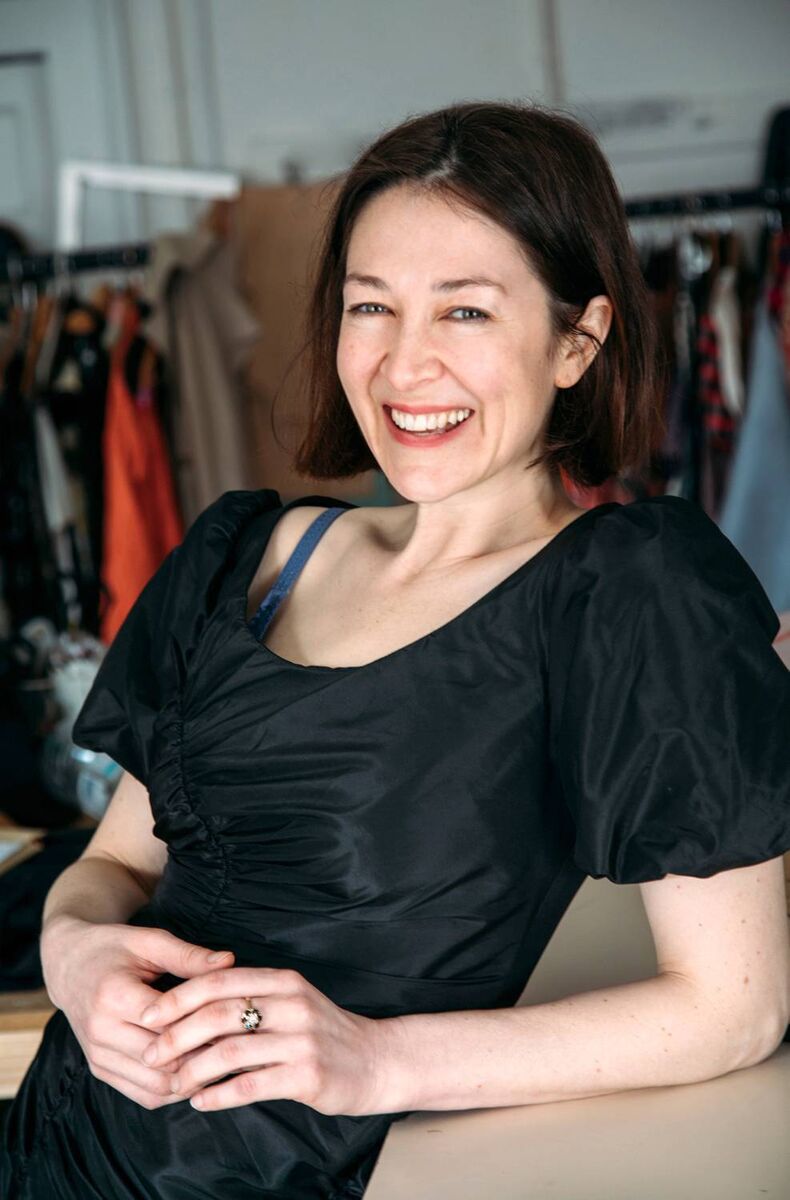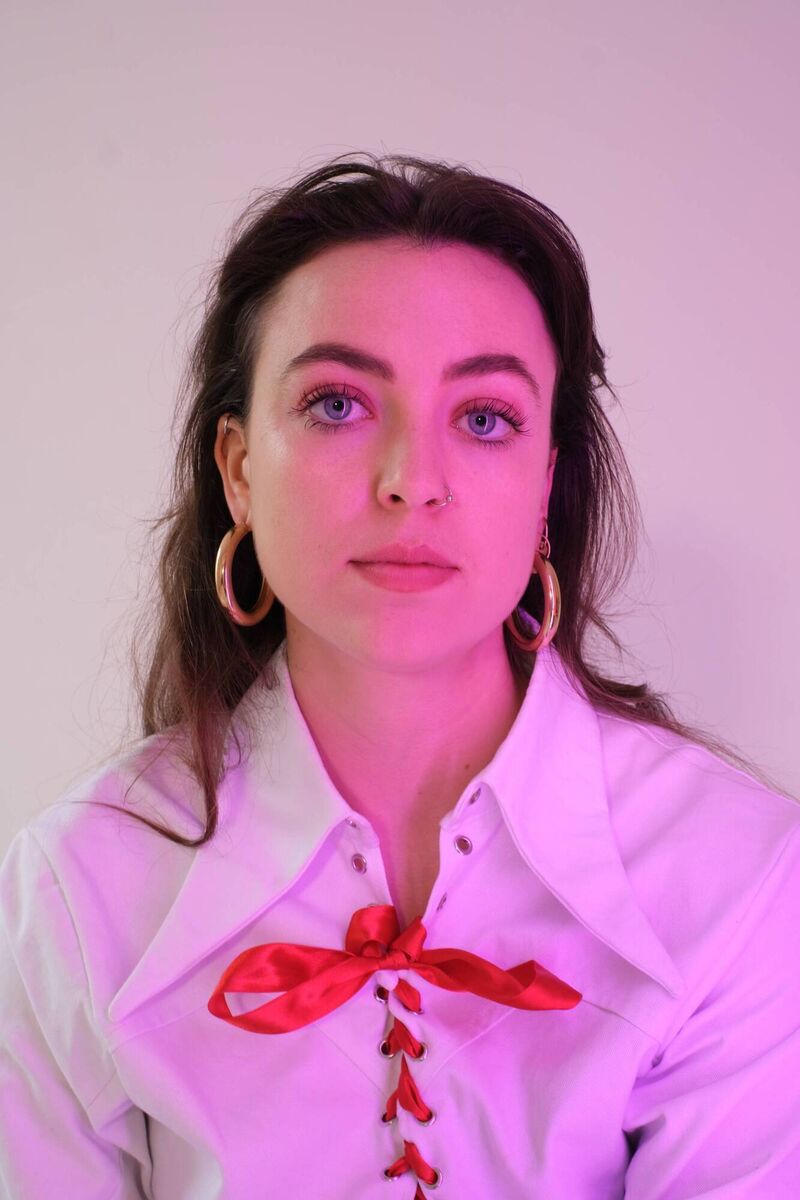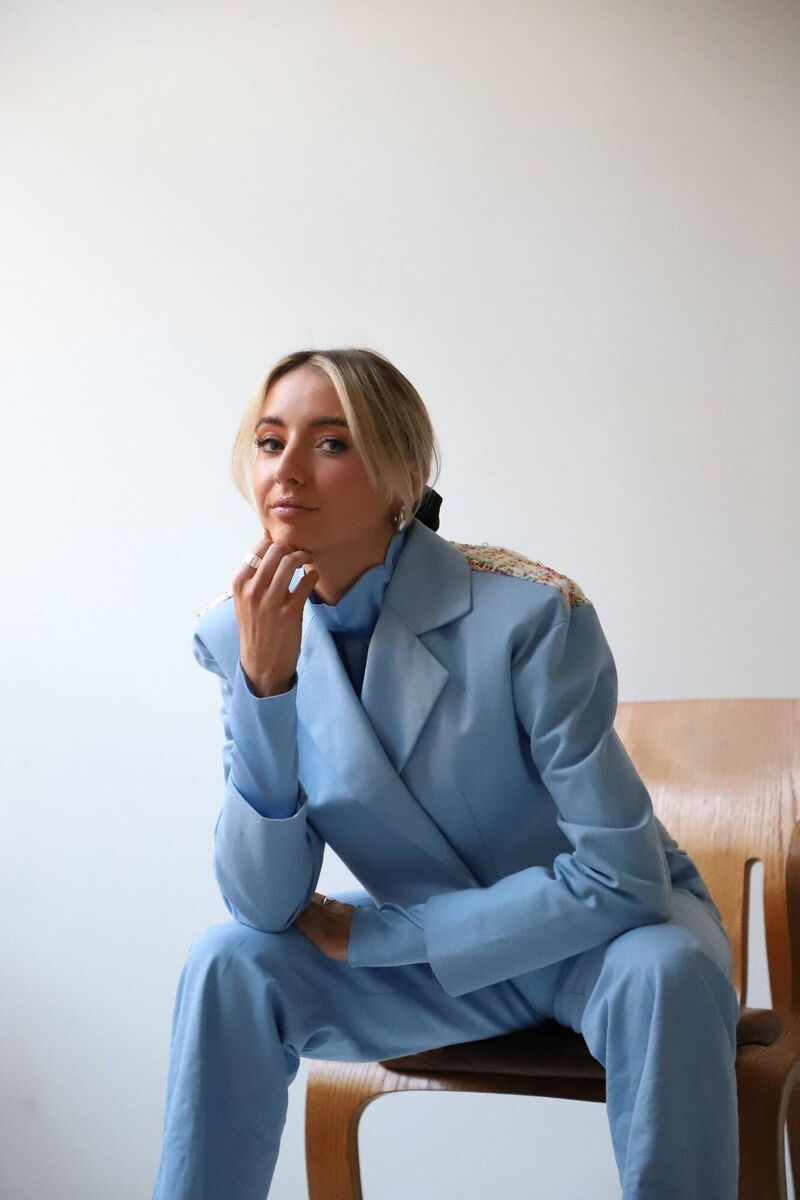The fashion and luxury industries are entering a new era where purpose is as important as profit, consumer expectations are rising, and the need for transparency is at an all-time high.
We wanted to shine a spotlight on the Irish people in the industry who are fostering new ideas, pushing forward innovation, and changing the way we view the future of these industries.
Niamh O’Donoghue secured a role as Victoria Beckham’s social media manager, and is now in a similar role with Stella McCartney. Pic: Andrew Dunsmore
You might not recognise Stella McCartney’s global head of social Niamh O’Donoghue in photos — as a communications lead, it’s her job to push other faces into the foreground — but you’ve most definitely seen her work; whether it was under Edward Enninful’s leadership at British Vogue or by way of Victoria Beckham’s eponymous brand’s fashion shows.
O’Donoghue, who hails from North Dublin, has been integral to curating meaningful content for luxury houses for years, along with carving out voices that speak to consumers who previously might have felt sidelined.
As a child, she spent a lot of time in hospital due to ill health — something she speaks about candidly — meaning that she knows what it means to have people who look like you looking back at you from glossy campaigns.
“We would have grown up in a time where, by beauty and fashion standards, you needed to be slim, pale, and blonde,” she says.
“And I very much didn’t see or feel represented for the body type that I had. That still influences my digital storytelling today.”
Since her first role at Image Magazine, she has embraced fashion tech and AI with aplomb.
In her early 20s, she was brought on board by the founder of Net-A-Porter, Lucy Yeomans, to work on her project Drest — the world’s first luxury fashion gaming platform.
“It essentially allows the player to go from fashion intern to fashion icon, working up the ranks of what a stylist would be.
“But it’s an extremely clever platform because not only can you style these challenges using real-world products, and with real-world people like hairstylist Sam McKnight, you can then go on to purchase the pieces after — which I just think is incredibly clever.
“Working at Drest allowed me to sit with people who write codes and build platforms, and allowed me to view the future of fashion in a broader scope.”
In November, she joined Stella McCartney after she was headhunted (again) for her trusted voice, consumer focus, and technological foresight.
“There was some really interesting research done last year that said that 59% of consumers will only spend with a brand once they’ve earned its trust,” she says.
“Trust is such a huge thing, especially for a
community-building engagement. And it’s also all of the other stuff, like ensuring that all of the celebrities that we’re working with align with the sustainable values of Stella McCartney.
“That’s something that hopefully I will be evolving and discovering more in my role this year.”
 Natalie B Coleman: Monaghan-born designer and UNFPA collaborator
Natalie B Coleman: Monaghan-born designer and UNFPA collaborator
The WHO estimates that 200m women alive right now have been cut in the practice of female genital mutilation.
This practice is usually carried out between infancy and the age of 15, and includes several different methods of mutilation of the vulva, clitoris, or vagina in a practice that has no medical benefit and is decreed a violation of human rights by the UN and the WHO.
In an attempt to draw attention to this, the United Nations Population Fund (UNFPA) partnered with Monaghan-born designer Natalie B Coleman back in 2018 — whose then-collection Guaranteed To Bleed caught attention, as well as her previous work which featured imagery associated with the female reproductive system — to present her 2019 presentation Sisters at London Fashion Week (LFW).
This collaborative collection was produced in association with UNFPA to commemorate the 25th anniversary of the International Conference on Population and Development.
Working with a team of skilled artisan craftspeople, Coleman’s work showcased handcrafted techniques that have been passed down through generations of Irish women.
Sisters was inspired by the plurality of feminism in our society today, and aimed to emphasise the importance of sisterhood in times of social change.
Traditionally seen as female-centric techniques, such as lace-making, weaving, knitting, and hand-embroidery, these were given entirely new textile treatments depicting the female reproductive system in different feminist forms.
There was a “Vagina Cake” sweater and the exquisitely embroidered bridal gown featuring Carrickmacross lacework on the sleeves, which were inspired by statistics on child marriage.
The collaboration consisted of the mainline Sisters collection, featuring these time-consuming and intricate methods of embellishment which were underpinned by a casual collection of screen-printed hoodies, t-shirts and silk scarves. The goal was to have sexual and reproductive health become a fundamental talking point of LFW.
Coleman’s work was shown in WWD, Elle, Vogue, Cosmopolitan, Global Citizen, Hunger Magazines and Surface.
Since then, her work has been centred closer to home. Though the UNFPA partnership remains, Coleman has been busying herself with teaching fashion students at NCAD. There, she encourages, guides, and continues to learn herself.
“We have a really strong year this year,” she says.
“They have some great research and a lovely sensitivity to their work. “
This year, her plans are plenty: The relaunch of her label with a series of three garment drops, the first drop in April (“six pieces, with a limited number of each available, working with local craftspeople and everything produced in Ireland”).
There is also an upcoming collaboration with textile designer Katie Hanlon around the idea of sexual rights and freedoms. Another dream remains on the horizon, however, one that has a social aspect.
“We would like to train women on finishing techniques who can then do ‘piece work’ from home, because I know how hard it is to manage working hours and childcare costs. So, you know, work you can do in your own time and also can still receive whatever support and resources that you’re entitled to.”
 Ríon Hannora: hopeful for fashion’s future
Ríon Hannora: hopeful for fashion’s future
Five years ago, LSAD fashion student Ríon Hannora O’Donovan was hand-dyeing her graduate collection with avocado pits and teaching children to sew after work.
Now, the award-winning slow fashion designer (she picked up one of five RDS Craft Awards in 2023, scooping the fashion award) is busy creating collections to be shown at fashion weeks around the world.
To look at her work is to look at wearable art — by way of the baroque era and fellow pioneer Vivienne Westwood.
Amazingly, the zero waste artist — whose work “feels totally connected to her, even when it’s bought,” — founded the brand by accident when she was shipped home to Cork by way of covid, following eight months away in San Francisco.
She was there to work with a brand focusing on denim deadstock (inventory that has never been sold, or sometimes returned) which doubled down on her intention to create fewer garments, but better ones.
“Oil-based dyes are really, really bad for you,” she says.
“They release toxins onto your skin and can even affect other clothes if you wash them together.
“They also release toxins into the water. I just wanted my collection to inform people of this, because it’s something not everybody knows.”
Hannora used part of her €10,000 prize to open a studio at the Om Diva Atelier, on Dublin’s Drury Street, where fans like Loah, CMAT, and Gemma Dunleavy come to try on her wares.
2024 is shaping up to be the most exciting year for the brand yet.
Hannora’s work is due to be shown at Copenhagen, New York, and Paris Fashion Weeks — all beacons of consumerism that Hannora is hoping to dilute with her slow, steady approach to beautiful garment making.
“I have a love/hate relationship with this industry at times,” she says. “But I’m hopeful for the future — that things are getting better, and people are thinking about their fashion choices more.”
 Aoife McNamara’s label is the first fashion brand in Ireland to receive B Corp certification
Aoife McNamara’s label is the first fashion brand in Ireland to receive B Corp certification
Back in October, sustainable fashion designer Aoife McNamara, founder of the eponymous fashion label, became the first fashion brand in Ireland to receive B Corp certification — an international gold standard to denote an environmental and socially-conscious business.
B Corp certification recognises companies that use business as a force for good, by meeting high ethical and environmental standards and positively impacting workers, communities, customers, and the planet.
Roughly 6,000 Certified B Corporations in over 80 countries and over 150 industries exist, from food and fashion to tech and finance.
The test to achieve it is rigorous, oftentimes running over a year, and involves stringent criteria across five categories: Environment, community, workers, customers, and governance.
In McNamara’s case, this involved sustainable and local sourcing practices; the removal of all virgin polyester from her supply chain; prioritising the use of Irish wool and linen; driving engagement with the local community through ongoing events; and supporting fellow purpose-driven enterprises.
“While we are the first fashion brand in Ireland to achieve B Corp, we want future fashion brands in the process of getting B Corp to beat our score,” she says.
Perhaps nothing proves her seriousness more than her choice to not launch an autumn/winter collection in 2023, opting to use the season for “degrowth”.
“We’re proud to say that the pieces from our previous winter collections remain as relevant and elegant as ever. We don’t follow fleeting trends.
“Instead, we create enduring designs that withstand the test of time. By choosing degrowth this season, we’re taking a significant step towards a more sustainable and responsible future,” she says.
A genuine pioneer, nature has always been at the forefront of McNamara’s brand ever since she set up her sustainable fashion brand in 2019, with a studio in a thatched cottage in Adare, Co Limerick.
She also teaches, hoping to spread the word that ethical fashion can also be luxurious and beautiful.
On the foot of her win, McNamara hosted stakeholders from the Irish fashion industry to engage in a discussion on driving sustainable and ethical practices forward within the sector. If there’s a person in Ireland we could all learn from right now, it’s Aoife.














